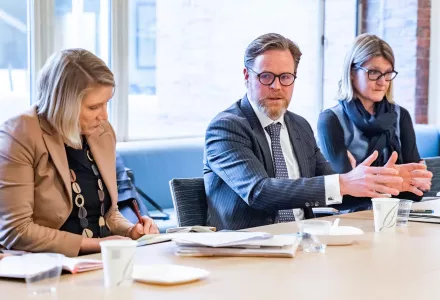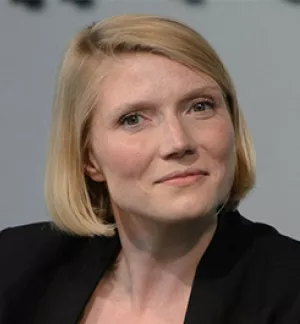
“To keep a great country alive, we have to defend it.” — Janne Kuusela, Director General for Defense Policy at the Ministry of Defense, Finland
February 7, 2020: With the advent of the digital age and the rise of Russia and China as global powers, the EU must do more to defend itself and its relationship with the United States, according to Janne Kuusela, Director General for Defense Policy at the Ministry of Defense, Finland. In an event moderated by Cathryn Clüver Ashbrook, Executive Director of the Future of Diplomacy Project and the Project on Europe and the Transatlantic Relationship he explained why Finland could be a potential paradigm for the EU’s defense strategy.
Kuusela discussed progress on EU defense policy, EU-NATO cooperation, and the best means to tackle transnational security challenges in the digital age with fellows, faculty and students at the Harvard Kennedy School. He was optimistic that with a former Defense Minister at the helm of the European Union, in EU Commission President Ursula von der Leyen, the EU would be better positioned to reprioritize its military strategy to include such initiatives as developing methods to counter terrorism, crafting a new defense agenda fit for the digital age, and a strong partnership with NATO to better leverage the US-EU relationship.
“NATO remains the cornerstone of European defense, but the EU has to bring more to the table. The past few years have been filled with bad news for the EU — [from] the economic [and] refugee crises to Brexit” — and European solidarity has suffered as a result.”
“The single topic that unites individuals across the EU is that people want the EU to do more for their security. The intention is not to fix a transatlantic problem but a European problem, one that has been plagued by underspending for a long time. Now, countries are spending more on defense, but it ought to be done in a coordinated and unified way,” he said. Security interests would be better served through greater EU cooperation rather than attempting progress through the individual efforts of member states.
Further, although Finland was not a NATO member it “shares the same security environment and issues as NATO, [that Finland] works well with NATO, [and that it is] one of the few partner countries working [with NATO] in Iraq.” He highlighted Finland’s purposeful investments in key military capabilities, reliance on civilian mobilization in times of war, and network of defense cooperation with the US and Norway.
To a question on increased Russian opportunism and China’s rise as a global power, Kuusela explained Finland’s strategy for handling foreign challenges:
“In Finland, we have found a way to cope with Russia [by focusing our relationship around] four components: dialogue, defense, resilience, and rules.” He brought up Russia’s acquisition of key Finnish communication industries and Finland’s legislative response to this “parasitic” Russian behavior as an example of Finland’s integrated foreign security response.
Finally, Kuusela highlighted a need for increased cooperation in jointly addressing the most pernicious issues in technological advancement today, including the development of transatlantic 5G capacities, in which European companies Nokia and Ericsson would have to play critical roles. Here, Europe is looking for active American partnership, Kuusela noted, not merely admonishments against allowing Chinese technology into European hardware structures. In addition, European efforts such as the Cyber Center of Excellence would have to continue to be resourced and expanded such that European countries could remain at the vanguard of addressing the integrated security challenges of the digital age.
Michalak, Winston Ellington. “The Future of the Transatlantic Defense Relationship: Views from Finland and the EU.” March 3, 2020



